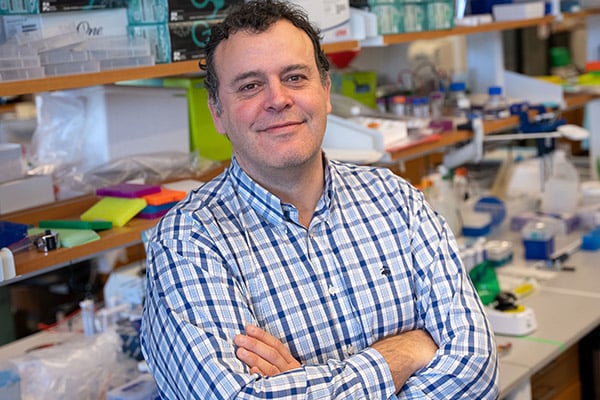UMass Chan’s gene therapy research expands to two ultra-rare diseases through grassroots funding partnerships
Date Posted: Wednesday, October 19, 2022 UMass Chan Medical School is advancing gene therapy research of two fatal, ultra-rare genetic disorders—Cockayne syndrome and UBA5—with help from family-driven funding partnerships. Researchers will harness the Medical School’s unique expertise in molecular therapeutics, which includes groundbreaking work on neurological diseases such as ALS, Tay-Sachs and Huntington’s, to develop treatments for these devastating disorders.
UMass Chan Medical School is advancing gene therapy research of two fatal, ultra-rare genetic disorders—Cockayne syndrome and UBA5—with help from family-driven funding partnerships. Researchers will harness the Medical School’s unique expertise in molecular therapeutics, which includes groundbreaking work on neurological diseases such as ALS, Tay-Sachs and Huntington’s, to develop treatments for these devastating disorders.
Both funding partners, Riaan Research Initiative and Raiden Science Foundation, are grassroots initiatives launched recently by the parents of a young child with Cockayne syndrome and UBA5 disorder, respectively. When a child is diagnosed with a rare disease for which there are few treatment options, families often face little hope for the future. Research about the associated genetic mutations may be limited, and funding opportunities for developing treatments are scarce due to low profitability.
UMass Chan’s newly created Translational Institute for Molecular Therapeutics was formed to address just this type of need. Under the direction of Miguel Sena-Esteves, PhD, associate professor of neurology, the institute is focused on both increasing the number of and reducing the costs associated with human gene therapy clinical trials for rare genetic diseases. Key to this effort is establishing a pipeline that moves research seamlessly from discovery to clinical trials and regulatory support. Also essential is philanthropic support to fund the work, which often comes from enterprising families or foundations.
As noted by Sena-Esteves, “Developing gene therapy treatments for diseases with a small number of patients is challenging in a commercial setting. However, there are numerous examples, including our own, where the partnership of parents with an unbendable determination to help their children with researchers in the gene therapy field have resulted in clinical trials for diseases in this category.”
Cockayne syndrome and the Riaan Research Initiative
Cockayne syndrome, first identified in 1936, impacts a few hundred children around the world and is primarily caused by mutations in genes CSA and CSB, which are responsible for the body’s DNA repair and transcription process. Children with Cockayne syndrome experience a form of premature aging, severe neurodegeneration, growth failures, microcephaly, vision and hearing impairments, hypotonia, developmental delays, and an extremely shortened lifespan.
Riaan Research Initiative, launched by Jo Kaur after her son Riaan was diagnosed with Cockayne syndrome at age 16 months, is funding the Medical School’s preclinical CSA gene replacement therapy research. Leading the research alongside Dr. Sena-Esteves is Ana Rita Batista, PhD, instructor in neurology.
“We hope to carry this work to the finish line and are honored to partner with the exceptional team of gene therapy scientists at the Medical School,” said Jo Kaur. “We are also grateful to Cockayne syndrome experts from around the world and members of our Scientific Advisory Board, who have provided valuable input to give us our best shot at developing a therapy.”
UBA5 and the Raiden Science Foundation
UBA5 disorder, a life-threatening progressive neurological disorder, typically involves muscle floppiness as well as stiffness, seizures, movement disorder, brain abnormalities, intellectual disability, poor head growth and failure to thrive. Caused by a gene mutation, there are only around 30 known cases in the world.
The Raiden Science Foundation, founded by Tommy and Linda Pham on behalf of their 2-year-old son, Raiden, provided funding to jump start the development of therapies for UBA5. Research is led by Heather Gray-Edwards, DVM, PhD, assistant professor of radiology, and Toloo Taghian, PhD, instructor in radiology, who work with Sena-Esteves and others across several departments.
The foundation is raising additional resources to support UBA5 research in the Translational Institute for Molecular Therapeutics. Said Tommy Pham, “The UMass team is like an all-star research team with years of knowledge and experience in the field of gene therapy that will give this the best chance at succeeding.”
